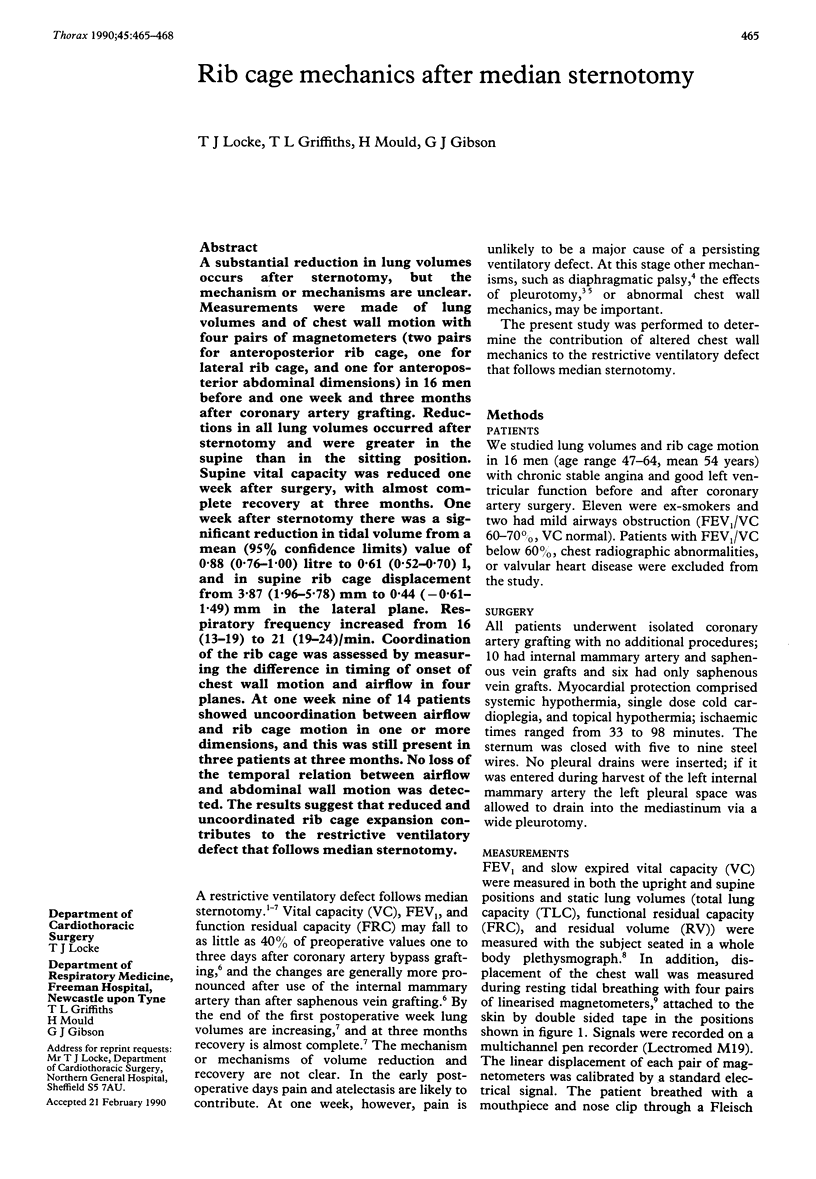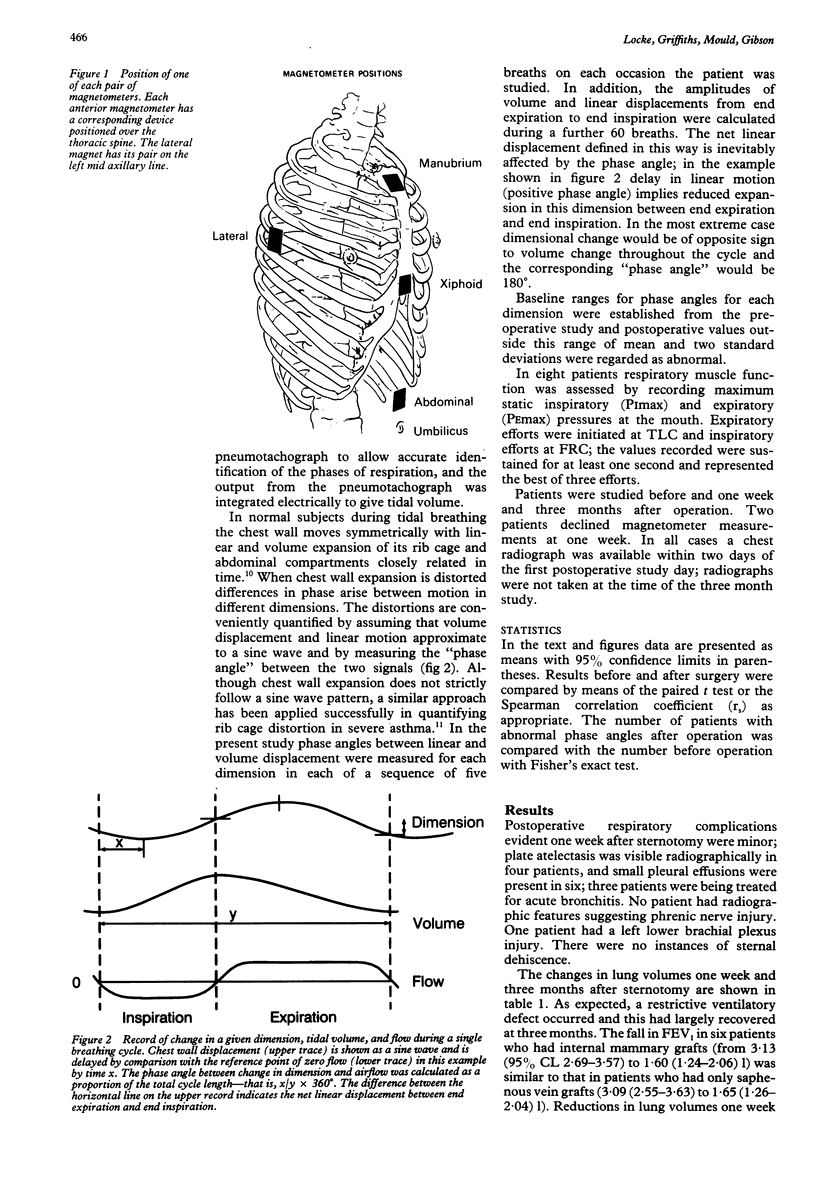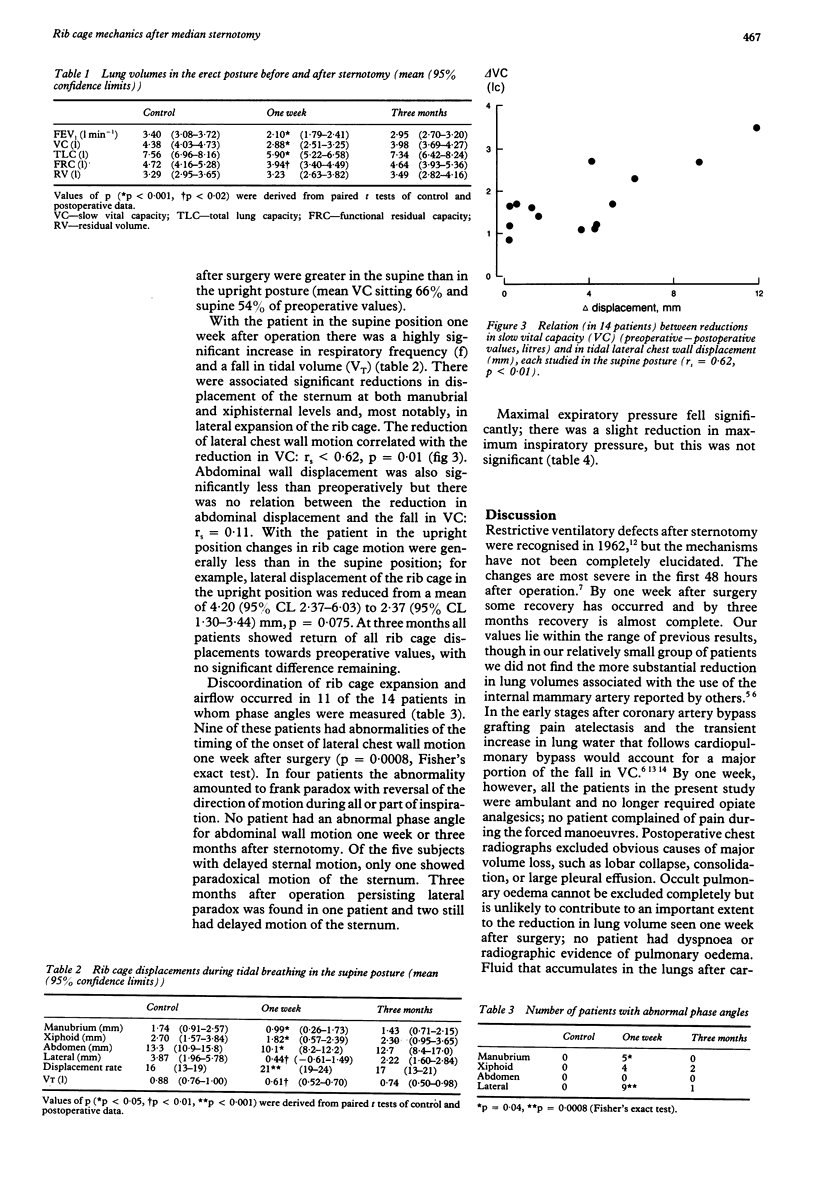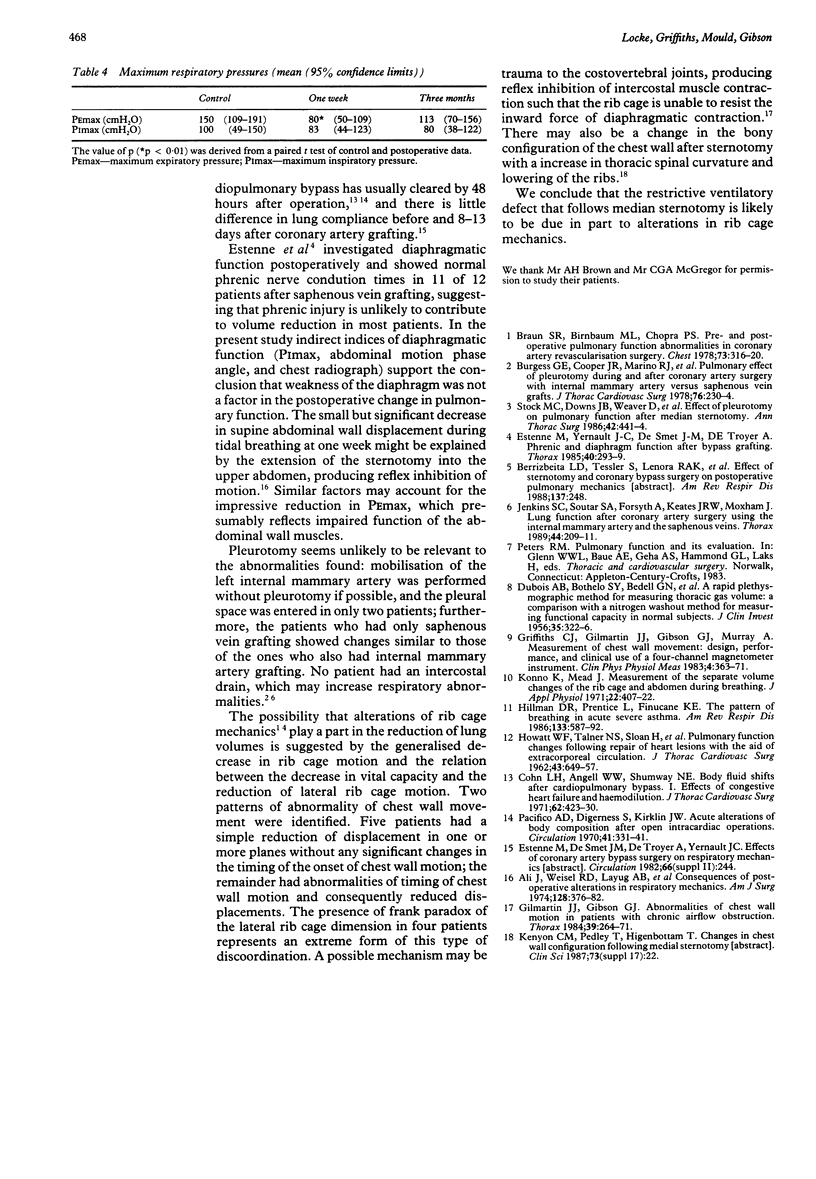Abstract
A substantial reduction in lung volumes occurs after sternotomy, but the mechanism or mechanisms are unclear. Measurements were made of lung volumes and of chest wall motion with four pairs of magnetometers (two pairs for anteroposterior rib cage, one for lateral rib cage, and one for anteroposterior abdominal dimensions) in 16 men before and one week and three months after coronary artery grafting. Reductions in all lung volumes occurred after sternotomy and were greater in the supine than in the sitting position. Supine vital capacity was reduced one week after surgery, with almost complete recovery at three months. One week after sternotomy there was a significant reduction in tidal volume from a mean (95% confidence limits) value of 0.88 (0.76-1.00) litre to 0.61 (0.52-0.70) l, and in supine rib cage displacement from 3.87 (1.96-5.78) mm to 0.44 (-0.61-1.49) mm in the lateral plane. Respiratory frequency increased from 16 (13-19) to 21 (19-24)/min. Coordination of the rib cage was assessed by measuring the difference in timing of onset of chest wall motion and airflow in four planes. At one week nine of 14 patients showed uncoordination between airflow and rib cage motion in one or more dimensions, and this was still present in three patients at three months. No loss of the temporal relation between airflow and abdominal wall motion was detected. The results suggest that reduced and uncoordinated rib cage expansion contributes to the restrictive ventilatory defect that follows median sternotomy.
Full text
PDF



Selected References
These references are in PubMed. This may not be the complete list of references from this article.
- Ali J., Weisel R. D., Layug A. B., Kripke B. J., Hechtman H. B. Consequences of postoperative alterations in respiratory mechanics. Am J Surg. 1974 Sep;128(3):376–382. doi: 10.1016/0002-9610(74)90176-7. [DOI] [PubMed] [Google Scholar]
- Braun S. R., Birnbaum M. L., Chopra P. S. Pre- and postoperative pulmonary function abnormalities in coronary artery revascularization surgery. Chest. 1978 Mar;73(3):316–320. doi: 10.1378/chest.73.3.316. [DOI] [PubMed] [Google Scholar]
- Burgess G. E., 3rd, Cooper J. R., Jr, Marino R. J., Peuler M. J., Mills N. L., Ochsner J. L. Pulmonary effect of pleurotomy during and after coronary artery bypass with internal mammary artery versus saphenous vein grafts. J Thorac Cardiovasc Surg. 1978 Aug;76(2):230–234. [PubMed] [Google Scholar]
- Cheitlin M. D. Cardiovascular trauma. Part II. Circulation. 1982 Jul;66(1):244–247. doi: 10.1161/01.cir.66.1.244. [DOI] [PubMed] [Google Scholar]
- Cohn L. H., Angell W. W., Shumway N. E. Body fluid shifts after cardiopulmonary bypass. I. Effects of congestive heart failure and hemodilution. J Thorac Cardiovasc Surg. 1971 Sep;62(3):423–430. [PubMed] [Google Scholar]
- DUBOIS A. B., BOTELHO S. Y., BEDELL G. N., MARSHALL R., COMROE J. H., Jr A rapid plethysmographic method for measuring thoracic gas volume: a comparison with a nitrogen washout method for measuring functional residual capacity in normal subjects. J Clin Invest. 1956 Mar;35(3):322–326. doi: 10.1172/JCI103281. [DOI] [PMC free article] [PubMed] [Google Scholar]
- Estenne M., Yernault J. C., De Smet J. M., De Troyer A. Phrenic and diaphragm function after coronary artery bypass grafting. Thorax. 1985 Apr;40(4):293–299. doi: 10.1136/thx.40.4.293. [DOI] [PMC free article] [PubMed] [Google Scholar]
- Griffiths C. J., Gilmartin J. J., Gibson G. J., Murray A. Measurement of chest wall movement; design, performance and clinical use of a four-channel magnetometer instrument. Clin Phys Physiol Meas. 1983 Nov;4(4):363–371. doi: 10.1088/0143-0815/4/4/001. [DOI] [PubMed] [Google Scholar]
- HOWATT W. F., TALNER N. S., SLOAN H., DEMUTH G. R. Pulmonary function changes following repair of heart lesions with the aid of extracorporeal circulation. J Thorac Cardiovasc Surg. 1962 May;43:649–657. [PubMed] [Google Scholar]
- Hillman D. R., Prentice L., Finucane K. E. The pattern of breathing in acute severe asthma. Am Rev Respir Dis. 1986 Apr;133(4):587–592. doi: 10.1164/arrd.1986.133.4.587. [DOI] [PubMed] [Google Scholar]
- Jenkins S. C., Soutar S. A., Forsyth A., Keates J. R., Moxham J. Lung function after coronary artery surgery using the internal mammary artery and the saphenous vein. Thorax. 1989 Mar;44(3):209–211. doi: 10.1136/thx.44.3.209. [DOI] [PMC free article] [PubMed] [Google Scholar]
- Konno K., Mead J. Measurement of the separate volume changes of rib cage and abdomen during breathing. J Appl Physiol. 1967 Mar;22(3):407–422. doi: 10.1152/jappl.1967.22.3.407. [DOI] [PubMed] [Google Scholar]
- Pacifico A. D., Digerness S., Kirklin J. W. Acute alterations of body composition after open intracardiac operations. Circulation. 1970 Feb;41(2):331–341. doi: 10.1161/01.cir.41.2.331. [DOI] [PubMed] [Google Scholar]
- Stock M. C., Downs J. B., Weaver D., Lebenson I. M., Cleveland J., McSweeney T. D. Effect of pleurotomy on pulmonary function after median sternotomy. Ann Thorac Surg. 1986 Oct;42(4):441–444. doi: 10.1016/s0003-4975(10)60555-3. [DOI] [PubMed] [Google Scholar]


